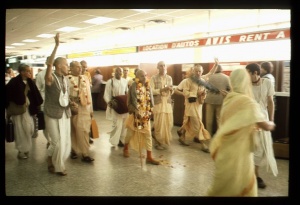CC Madhya 20.306 (1975): Difference between revisions
(Vanibot #0027: CCMirror - Mirror CC's 1996 edition to form a basis for 1975) |
(Vanibot #0020: VersionCompareLinker - added a link to the Version Compare feature) |
||
| Line 2: | Line 2: | ||
<div style="float:left">'''[[Sri Caitanya-caritamrta (1975)|Śrī Caitanya-caritāmṛta (1975)]] - [[CC Madhya (1975)|Madhya-līlā]] - [[CC Madhya 20 (1975)|Chapter 20: Lord Śrī Caitanya Mahāprabhu Instructs Sanātana Gosvāmī in the Science of the Absolute Truth]]'''</div> | <div style="float:left">'''[[Sri Caitanya-caritamrta (1975)|Śrī Caitanya-caritāmṛta (1975)]] - [[CC Madhya (1975)|Madhya-līlā]] - [[CC Madhya 20 (1975)|Chapter 20: Lord Śrī Caitanya Mahāprabhu Instructs Sanātana Gosvāmī in the Science of the Absolute Truth]]'''</div> | ||
<div style="float:right">[[File:Go-previous.png|link=CC Madhya 20.305 (1975)|Madhya-līlā 20.305]] '''[[CC Madhya 20.305 (1975)|Madhya-līlā 20.305]] - [[CC Madhya 20.307 (1975)|Madhya-līlā 20.307]]''' [[File:Go-next.png|link=CC Madhya 20.307 (1975)|Madhya-līlā 20.307]]</div> | <div style="float:right">[[File:Go-previous.png|link=CC Madhya 20.305 (1975)|Madhya-līlā 20.305]] '''[[CC Madhya 20.305 (1975)|Madhya-līlā 20.305]] - [[CC Madhya 20.307 (1975)|Madhya-līlā 20.307]]''' [[File:Go-next.png|link=CC Madhya 20.307 (1975)|Madhya-līlā 20.307]]</div> | ||
{{CompareVersions|CC|Madhya 20.306|CC 1975|CC 1996}} | |||
{{RandomImage}} | {{RandomImage}} | ||
==== TEXT 306 ==== | ==== TEXT 306 ==== | ||
<div class="verse"> | <div class="verse"> | ||
:yasyāṅghri-paṅkaja-rajo | :yasyāṅghri-paṅkaja-rajo 'khila-loka-pālair | ||
:mauly-uttamair dhṛtam upāsita-tīrtha-tīrtham | :mauly-uttamair dhṛtam upāsita-tīrtha-tīrtham | ||
:brahmā bhavo | :brahmā bhavo 'ham api yasya kalāḥ kalāyāḥ | ||
:śrīś codvahema ciram asya nṛpāsanaṁ kva | :śrīś codvahema ciram asya nṛpāsanaṁ kva | ||
</div> | </div> | ||
| Line 27: | Line 26: | ||
<div class="translation"> | <div class="translation"> | ||
" 'What is the value of a throne to Lord Kṛṣṇa? The masters of the various planetary systems accept the dust of His lotus feet on their crowned heads. That dust makes the holy places sacred, and even Lord Brahmā, Lord Śiva, Lakṣmī and I myself, who are all portions of His plenary portion, eternally carry that dust on our heads.' | |||
</div> | </div> | ||
| Line 34: | Line 33: | ||
<div class="purport"> | <div class="purport"> | ||
This is a quotation from Śrīmad-Bhāgavatam ([[SB 10.68.37]]). When the Kauravas flattered Baladeva so that He would become their ally and spoke ill of Śrī Kṛṣṇa, Lord Baladeva | This is a quotation from Śrīmad-Bhāgavatam ([[SB 10.68.37|10.68.37]]). When the Kauravas flattered Baladeva so that He would become their ally and spoke ill of Śrī Kṛṣṇa, Lord Baladeva was angry and spoke this verse. | ||
</div> | </div> | ||
Latest revision as of 13:12, 27 January 2020

A.C. Bhaktivedanta Swami Prabhupada
TEXT 306
- yasyāṅghri-paṅkaja-rajo 'khila-loka-pālair
- mauly-uttamair dhṛtam upāsita-tīrtha-tīrtham
- brahmā bhavo 'ham api yasya kalāḥ kalāyāḥ
- śrīś codvahema ciram asya nṛpāsanaṁ kva
SYNONYMS
yasya—whose; aṅghri-paṅkaja—lotuslike feet; rajaḥ—the dust; akhila-loka—of the universal planetary systems; pālaiḥ—by the masters; mauli-uttamaiḥ—with valuable turbans on their heads; dhṛtam—accepted; upāsita—worshiped; tīrtha-tīrtham—the sanctifier of the holy places; brahmā—Lord Brahmā; bhavaḥ—Lord Śiva; aham api—even I; yasya—of whom; kalāḥ—portions; kalāyāḥ—of a plenary portion; śrīḥ—the goddess of fortune; ca—and; udvahema—we carry; ciram—eternally; asya—of Him; nṛpa-āsanam—the throne of a king; kva—where.
TRANSLATION
" 'What is the value of a throne to Lord Kṛṣṇa? The masters of the various planetary systems accept the dust of His lotus feet on their crowned heads. That dust makes the holy places sacred, and even Lord Brahmā, Lord Śiva, Lakṣmī and I myself, who are all portions of His plenary portion, eternally carry that dust on our heads.'
PURPORT
This is a quotation from Śrīmad-Bhāgavatam (10.68.37). When the Kauravas flattered Baladeva so that He would become their ally and spoke ill of Śrī Kṛṣṇa, Lord Baladeva was angry and spoke this verse.